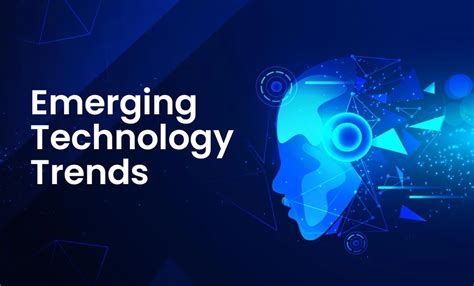The world of emerging technologies is vast and fascinating, with new innovations and breakthroughs happening every day. From artificial intelligence and blockchain to the Internet of Things and 5G, the possibilities are endless, and the potential impact on our lives is immense.
As we navigate this complex and rapidly changing landscape, it's essential to stay informed and up-to-date on the latest developments. Whether you're a tech enthusiast, a business leader, or simply someone who wants to understand the world around you, exploring the world of emerging technologies can be a rewarding and eye-opening experience.
In this article, we'll delve into some of the most exciting and promising emerging technologies, exploring their potential applications, benefits, and challenges. We'll also examine the trends and innovations that are shaping the future of technology and society.
Artificial Intelligence: The Future of Intelligence

Artificial intelligence (AI) is one of the most significant emerging technologies of our time. AI refers to the development of computer systems that can perform tasks that would typically require human intelligence, such as learning, problem-solving, and decision-making.
AI has the potential to revolutionize numerous industries, from healthcare and finance to transportation and education. For instance, AI-powered chatbots can help businesses automate customer service, while AI-driven analytics can help doctors diagnose diseases more accurately.
However, AI also raises important questions about job displacement, bias, and accountability. As AI becomes increasingly ubiquitous, it's essential to consider the social and ethical implications of this technology.
Types of AI
There are several types of AI, including:
- Narrow or weak AI: Designed to perform a specific task, such as facial recognition or language translation.
- General or strong AI: Aims to replicate human intelligence and can perform any intellectual task.
- Superintelligence: Significantly more intelligent than human intelligence.
Blockchain: The Future of Security

Blockchain is a distributed ledger technology that enables secure, transparent, and tamper-proof transactions. By creating a permanent and unalterable record of all transactions, blockchain can help prevent fraud, ensure data integrity, and build trust.
Blockchain has far-reaching applications, from cryptocurrency and supply chain management to voting systems and identity verification. However, blockchain also faces challenges related to scalability, regulation, and energy consumption.
Blockchain Benefits
Some of the key benefits of blockchain include:
- Security: Blockchain's decentralized and immutable nature makes it highly secure.
- Transparency: All transactions are recorded publicly, ensuring transparency and accountability.
- Efficiency: Blockchain can automate processes and reduce transaction times.
Internet of Things: The Future of Connectivity

The Internet of Things (IoT) refers to the network of physical devices, vehicles, and other items that are embedded with sensors, software, and connectivity, allowing them to collect and exchange data.
IoT has the potential to transform numerous industries, from manufacturing and logistics to healthcare and smart cities. However, IoT also raises concerns related to data privacy, security, and interoperability.
IoT Applications
Some of the most promising IoT applications include:
- Smart homes: IoT can help automate and optimize home systems, such as lighting and temperature control.
- Industrial automation: IoT can help manufacturers optimize production processes and improve efficiency.
- Wearable technology: IoT can help track health and fitness metrics, such as heart rate and step count.
5G: The Future of Communication

5G is the fifth generation of wireless network technology, promising faster speeds, lower latency, and greater connectivity. 5G has the potential to revolutionize numerous industries, from entertainment and education to healthcare and transportation.
However, 5G also faces challenges related to infrastructure, security, and health concerns.
5G Benefits
Some of the key benefits of 5G include:
- Faster speeds: 5G can deliver speeds up to 100 times faster than 4G.
- Lower latency: 5G can reduce latency to as little as 1 ms.
- Greater connectivity: 5G can support a vast number of devices and connections.






As we explore the world of emerging technologies, it's essential to remember that the future is not yet written. The choices we make today will shape the world of tomorrow, and it's up to us to ensure that these technologies are developed and used responsibly.
We invite you to share your thoughts and opinions on the future of emerging technologies. How do you think these technologies will impact our lives and society? What are the most significant challenges and opportunities that we face?
Join the conversation and help shape the future of emerging technologies.
What is the Internet of Things (IoT)?
+The Internet of Things (IoT) refers to the network of physical devices, vehicles, and other items that are embedded with sensors, software, and connectivity, allowing them to collect and exchange data.
What are the benefits of 5G?
+Some of the key benefits of 5G include faster speeds, lower latency, and greater connectivity.
What is blockchain technology?
+Blockchain is a distributed ledger technology that enables secure, transparent, and tamper-proof transactions.
